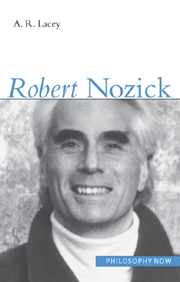Book contents
- Frontmatter
- Contents
- Preface
- 1 Introduction
- 2 Anarchy, State, and Utopia: the moral basis
- 3 Anarchy, State, and Utopia: the political outcome
- 4 The later ethics and politics
- 5 Epistemology
- 6 Rationality
- 7 Metaphysics I: personal identity
- 8 Metaphysics II: explaining existence
- 9 Metaphysics III: free will and retribution
- 10 The meaning of life
- Guide to further reading
- Bibliography
- Index
5 - Epistemology
- Frontmatter
- Contents
- Preface
- 1 Introduction
- 2 Anarchy, State, and Utopia: the moral basis
- 3 Anarchy, State, and Utopia: the political outcome
- 4 The later ethics and politics
- 5 Epistemology
- 6 Rationality
- 7 Metaphysics I: personal identity
- 8 Metaphysics II: explaining existence
- 9 Metaphysics III: free will and retribution
- 10 The meaning of life
- Guide to further reading
- Bibliography
- Index
Summary
Introduction: internalism and externalism
It is generally agreed among reviewers that Chapter 3, on epistemology, is the best chapter in Philosophical Explanations. It is not very original. Its leading ideas were already put forward by Dretske in particular a decade or more earlier, as Nozick acknowledges in some detail (PE: 689 n.53). But it is with Nozick that the ideas really come to the fore, perhaps because he has developed them more extensively. The chapter has three sections, on knowledge, scepticism and evidence, of which the first two are very closely bound together.
We can set the stage by introducing a contrast – prominent in recent discussions of epistemology – between internalism and externalism. How does knowledge go beyond mere belief? (I say “mere” belief because nearly everyone agrees that knowledge, at least of facts as opposed to people, places, etc., does involve belief, although there are exceptions (see McGinn 1984, especially 547ff.). Clearly to be knowledge a belief must be true. We may think we know, or feel absolutely certain about, something false, but once we agree it is false we must withdraw any claim to know or have known it. (This is sometimes expressed by saying that “know” is a “factive” verb.) But more interesting is the question: what must be true about the knower himself? This raises issues about the role of knowledge in our lives. Why do we have the concept of knowledge at all?
- Type
- Chapter
- Information
- Robert Nozick , pp. 100 - 132Publisher: Acumen PublishingPrint publication year: 2001



